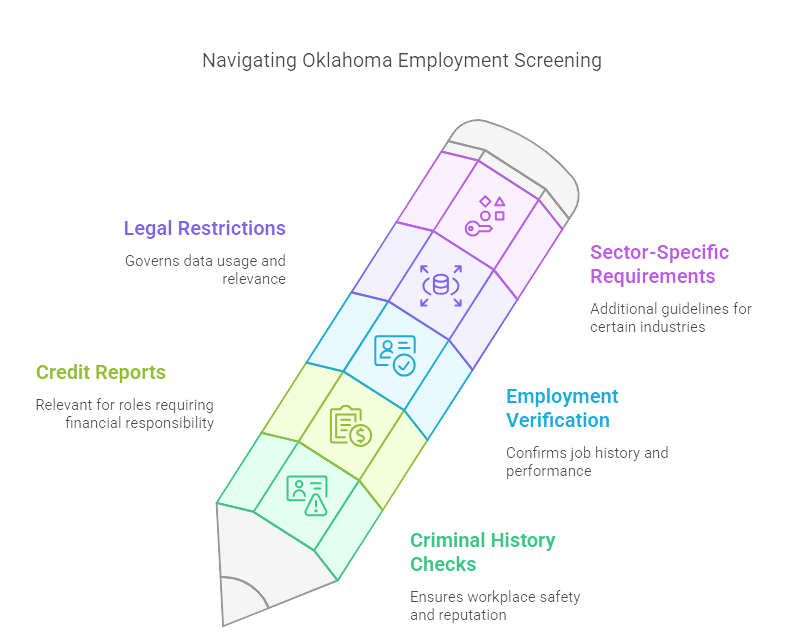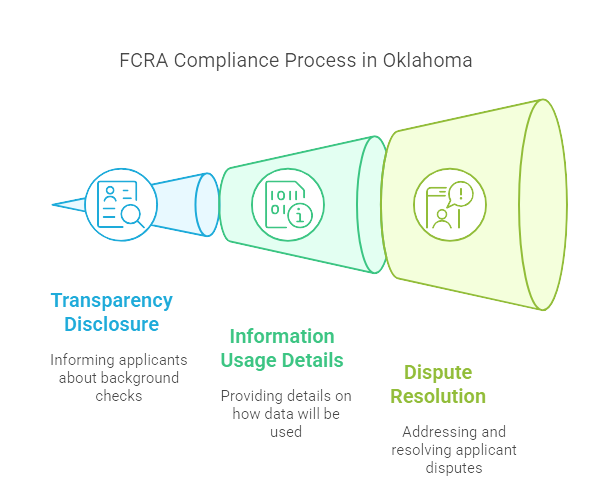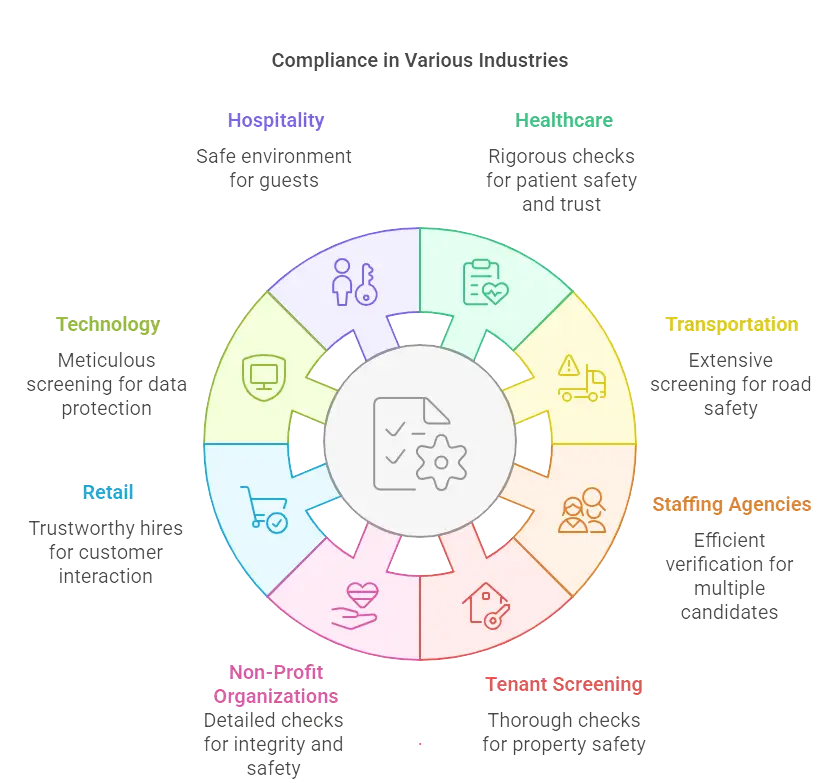Navigating the intricacies of employment screening is challenging, but essential, especially when it comes to staying compliant with Oklahoma background check laws. As an employer, understanding these legal requirements is crucial in maintaining a fair hiring process and protecting your business from potential litigation. This guide will outline the key aspects of Oklahoma's hiring laws, providing you with the knowledge needed to conduct compliant background checks.
Key Takeaways
- Oklahoma background check laws integrate state and federal regulations, with public employers adhering to a "ban-the-box" policy delaying criminal inquiries.
- Federal laws like the FCRA set baseline requirements, demanding applicant consent and non-discriminatory use of background information in employment decisions.
- Employers in Oklahoma need to ensure the relevance of gathered background check data to job functions, mindful of sector-specific guidelines.
- Establishing robust HR compliance plans with thorough documentation is crucial for legal protection and efficient hiring processes.
- Engaging with professional resources and continuing education supports ongoing compliance with both state and federal background screening laws.
Understanding Oklahoma Background Check Laws
Navigating Oklahoma's background check laws requires attention to detail, given the unique blend of state and federal regulations. Unlike some states, Oklahoma allows employers to consider certain types of information, but it’s vital to know the nuances.
EXPERT INSIGHT: As an HR professional, I've discovered that behind every background check is a human story—and it's on us to read it with clarity and empathy. Following Oklahoma’s laws to conduct screenings is not simply a box-checking exercise—it's about finding a balance of protecting our organizations and providing individuals with a fair chance to begin anew. One of the most challenging—and rewarding—aspects of doing this work is making sure that due diligence doesn't turn into disqualification by default. Because in screening with integrity, we're doing more than just hiring employees; we're creating opportunity, rebuilding trust, and honoring the dignity of work. - Charm Paz, CHRP
Overview of State Laws
Oklahoma doesn’t impose state-specific restrictions on background checks, but that doesn’t mean employers have carte blanche. For example, Oklahoma law doesn’t have a statewide Ban-the-Box policy for private employers. However, for public employers, it mandates that criminal record inquiries are delayed until after an applicant's qualifications have been reviewed, barring specific positions where a clean record is crucial from the start.
Federal Laws Impact
When it comes to background checks, federal laws set the baseline. The Fair Credit Reporting Act (FCRA) is a critical piece of the puzzle. It governs how background checks should be conducted, requiring consent from applicants before a check, and mandates disclosure of results. Also, the Equal Employment Opportunity Commission (EEOC) recommends that employers use background information to make employment decisions in a non-discriminatory way, meaning decisions should relate directly to job duties rather than blanket policies that might disproportionately affect certain groups.
Understanding these laws is essential. They not only set the ground rules but also help Oklahoma employers ensure their hiring practices are both fair and compliant. Employers should also remain vigilant about changes in both state and federal regulations to avoid potential pitfalls and legal challenges.
Key Components of Oklahoma Employment Screening
Navigating the terrain of employment screening in Oklahoma requires an understanding of the different types of background checks available and the legal framework that governs their use. First off, let's break down the types of checks you might consider. Criminal history checks are at the forefront, helping to ensure that new hires don't pose a risk to workplace safety or reputation. Credit reports can also be relevant, particularly in roles where financial responsibility is key. Employment verification checks round out the list, as they help confirm an applicant's past job titles, duration of employment, and sometimes even performance.
When it comes to legal restrictions and permissions, Oklahoma has its ground rules. Employers are free to access publicly available records, but they must ensure that the information gathered is relevant to the job at hand. Misuse or unnecessary digging into a prospective employee's background can quickly lead to legal troubles. The guiding principle should be relevance — only gather and use data that directly impacts the essential functions of the position you're trying to fill. Additionally, be aware of any sector-specific limitations or requirements. For example, certain industries may have additional guidelines on the reporting or documentation of gathered data.
Understanding Oklahoma's background check legal landscape not only keeps you compliant but also helps establish a transparent and ethical hiring process, laying the groundwork for trusted employer-employee relationships.

Oklahoma HR Compliance: Best Practices
Navigating the landscape of Oklahoma background check laws starts with building a solid HR compliance plan. This isn't just good practice—it's an essential step in shielding your business from legal pitfalls. To kick off, outline clear policies that align with state and federal regulations. Ensure everyone involved in hiring knows these procedures inside out. Training sessions can reinforce understanding and highlight changes in the laws as they occur.
Next up, invest in comprehensive documentation and recordkeeping. This means maintaining detailed records of background checks and applicant consent forms. Having an organized system can be a lifesaver if your hiring practices are ever questioned. Consistently updating these records will make auditing your processes a breeze and ensure that nothing slips through the cracks.
Link these practices back to broader compliance resources. There are plenty available, like the FCRA Compliance guide, that provide additional depth and clarity. Use these tools to stay sharp and informed, turning compliance into a seamless part of your HR operations.
Navigating the Legal Requirements in Oklahoma
When navigating the legal landscape of Oklahoma background checks, clarity and precision are key. Begin with transparency: before conducting any background check, secure written consent from the applicant. This step isn't just ethical—it's a legal necessity. Inform candidates about the kinds of checks you plan to perform and how any gathered information might influence your hiring decisions. Document every step meticulously to ensure compliance and build trust.
If an applicant's background check leads you toward an adverse hiring decision, follow the Federal Trade Commission’s guidelines. First, provide the candidate with a "pre-adverse action" notice, enclosing a copy of the background report and a summary of their rights under the FCRA. This move allows candidates to explain or contest the findings. Finally, if the decision stands, send an "adverse action" notice, confirming your choice and reiterating their rights, although disappointing, clear communication can limit misunderstandings and potential disputes.
Understanding these steps and adhering to the procedures not only shields your business from legal pitfalls but also reinforces its reputation as a fair and responsible employer. By integrating these guidelines into your hiring practices, you're not merely complying with the law—you're committing to a respectful and transparent employment process.

Ensuring Compliance with Oklahoma Hiring Laws
Ban-the-Box Legislation
In Oklahoma, the "ban-the-box" initiative affects how employers engage with potential hires. This legislation prevents employers from asking about an applicant's criminal history on initial job applications, allowing candidates to be judged first on their qualifications. Although statewide ban-the-box laws do not generally apply to private employers, public sector employers must adhere to these regulations, ensuring a fair initial assessment. Companies should review their hiring practices and forms to remain aligned with this approach, providing equal opportunities and reducing the stigma associated with early disclosure of criminal records.
Aligning with National Standards
While navigating state-specific laws, it's crucial to harmonize Oklahoma's practices with national standards. The Fair Credit Reporting Act (FCRA) and guidance from the Equal Employment Opportunity Commission (EEOC) offer frameworks ensuring fairness and transparency nationwide. Oklahoma employers should integrate these federal requirements with state legislation to craft a cohesive policy. Engaging with the Professional Background Screening Association (PBSA) can provide insight into aligning industry standards with legal mandates. Balancing state and federal rules ensures comprehensive compliance and protects both the company and its prospective employees from legal oversights.
Oklahoma FCRA Compliance Considerations
Navigating FCRA compliance in Oklahoma isn't rocket science, but it demands attention. At the forefront is transparency about consumer rights. As an employer, you're required to inform applicants that their background information might influence hiring decisions. This disclosure isn't just a courtesy; it's a legal obligation. You've got to hand over a "standalone document" that clearly states this, minus the legal jargon clutter.
Then there's the applicant's right to know how their information will be used. The fine print matters. You should provide details about the information being gathered, ensuring there's no ambiguity for the candidate. This transparency isn't just about ticking boxes—it's crucial for building trust.
If an applicant disputes the findings, you're no bystander. The FCRA outlines clear steps you must follow to address these concerns. You need to provide the applicant with a copy of the report and a summary of their rights under the FCRA. It's more about facilitating dialogue than entering into legal scuffles. Your role? To keep the process smooth and fair, making sure consumers have every opportunity to correct inaccuracies.
Keeping these aspects of FCRA compliance in check might seem like a hassle, but they form the backbone of a fair hiring process. Remember, staying clear on these points helps shield your business from potential legal pitfalls while respecting applicant rights.

Resources for Ongoing Compliance
Utilizing Professional Associations
Staying compliant with the rapidly changing landscape of employment laws requires continuous effort. Engaging with professional associations such as the Society for Human Resource Management (SHRM) can provide invaluable insights. They offer a treasure trove of resources, ranging from webinars to policy updates, that keep you in the loop about emerging legal trends and best practices specific to Oklahoma's employment screening requirements.
Continuing Education and Training
Regular training sessions and workshops are essential for HR teams striving for compliance excellence. Programs focused on the nuances of state and federal laws can arm your team with the knowledge needed to navigate complex screening processes confidently. By investing in continuing education, businesses not only enhance their compliance but also safeguard against potential legal missteps.
Related Government Websites in Oklahoma
| Website Name | URL | Description |
|---|---|---|
| Oklahoma Department of Labor | oklahoma.gov/labor | Provides resources on labor laws, workplace safety, and employment standards. |
| Oklahoma State Bureau of Investigation (OSBI) | osbi.ok.gov | Offers criminal history records and background check services for employers. |
| Department of Transportation (Oklahoma) | oklahoma.gov/odot | Manages driving records and licensing, relevant for background checks in transportation roles. |
| Oklahoma Employment Security Commission | oklahoma.gov/oesc | Provides information on unemployment benefits, workforce development, and employment regulations. |
| Oklahoma Secretary of State | sos.ok.gov | Offers business registration, compliance information, and other resources for employers. |
Compliance in Various Industries
Healthcare
In the healthcare sector, rigorous background checks are non-negotiable. Patient safety and trust are paramount, so healthcare providers must follow stringent guidelines. This typically involves thorough screening processes that include checks on criminal records, professional licenses, and employment history to confirm the qualifications and trustworthiness of potential staff members.
Transportation
Background checks are especially significant in the transportation industry due to the high level of responsibility involved. Drivers, particularly those holding Commercial Driver's Licenses (CDL), are subject to extensive screening, including driving records and substance abuse testing. Compliance with federal regulations, such as those enforced by the Department of Transportation (DOT), is essential to avoid hefty fines and ensure road safety.
Staffing Agencies
Staffing agencies face the unique challenge of handling background checks for many candidates. Maintaining compliance involves a streamlined process that efficiently verifies criminal records, employment history, and educational qualifications. Additionally, agencies must stay updated on legal changes to avoid non-compliance risks.
Tenant Screening
Property managers and landlords in Oklahoma must conduct thorough background checks to safeguard their properties and communities. This includes verifying criminal records, credit history, and rental history to ensure prospective tenants are reliable. Adhering to the Fair Housing Act (FHA) and other state regulations prevents discrimination and promotes a fair screening process.
Non-Profit Organizations
The integrity and safety of staff and volunteers are crucial for non-profits. Detailed background checks help prevent potential risks and protect vulnerable populations. This includes verifying criminal records and ensuring that staff and volunteers do not have histories that could jeopardize the organization's mission and the people they serve.
Retail
Retail businesses must focus on hiring individuals who can be trusted in environments with high customer interaction and access to sensitive information. Background checks in this sector often involve criminal record screenings and, in some cases, credit checks, especially for roles involving financial transactions. Ensuring compliance helps maintain a safe shopping environment and protects company assets.
Technology
With its access to sensitive data and intellectual property, the tech industry requires meticulous background screening protocols. These include verifying educational and employment history and, more critically, criminal records that might indicate risks of data breaches or intellectual property theft. Compliance helps tech firms maintain the trust of clients and stakeholders.
Hospitality
In hospitality, the focus is on creating a safe and welcoming environment for guests. Background checks are essential for positions involving direct customer interaction, access to guest rooms, and handling financial transactions. Ensuring employees have clean records and verified credentials protects the business's reputation and fosters a secure environment for staff and patrons.
Conclusion
Navigating the web of Oklahoma employment screening laws isn't just a box-checking exercise—it's an essential part of responsible business management. Adhering to these regulations helps protect your company from legal missteps and promotes a fair process for applicants. Recap best practices, like obtaining written consent, performing checks thoughtfully, and understanding the intricacies of "ban-the-box" laws, to keep your hiring procedures up to date.
Staying proactive is key. Regularly update your HR policies to align with evolving laws and work closely with legal advisors. This forward-thinking approach is not only a shield against potential litigation but also a step toward cultivating a more trustworthy organizational climate. Your commitment to ongoing education and adherence ensures that your business is always on the right side of the line, ready to grow with peace of mind.
Further Reading and Resources
When it comes to diving deeper into Oklahoma background check laws, it's crucial to have a toolkit of resources at your fingertips. Start with our article on Ensuring Compliance in Employment Background Checks for a comprehensive look at best practices and legal nuances specific to employment screenings. For those eager to expand their knowledge beyond state lines, authoritative sites such as the EEOC and the FTC offer valuable insights into federal regulations and consumer rights. Whether you're a seasoned HR professional or new to the world of employment screenings, these resources serve as an essential basis for ensuring your business remains both compliant and competitive.

Frequently Asked Questions
How far do background checks go in Oklahoma?
In Oklahoma, background checks typically review the last seven years of an individual's criminal history. However, the scope can extend further depending on the type of check being conducted and the regulations governing specific industries or roles. Some positions, especially those related to security, law enforcement, or financial services, may require a more comprehensive review that spans further back.
How much are background checks in Oklahoma?
The cost of background checks in Oklahoma varies based on the depth and details required. For a basic criminal history check through the Oklahoma State Bureau of Investigation (OSBI), fees typically range from $15 to $20. More comprehensive checks that might include employment verification, education checks, or other records can be more costly, often depending on the services of private companies used.
What is a background check for DPS in Oklahoma?
A background check for the Department of Public Safety (DPS) in Oklahoma involves examining an individual’s driving record and criminal history. This may include looking at any traffic violations, DUI charges, license suspensions, and any criminal offenses that might impact the person's suitability for positions or responsibilities related to public safety.
What is included in an Oklahoma background check?
An Oklahoma background check can include criminal history, driving records, employment verification, education history, credit reports, and any relevant licensure verification. The specific elements depend on the purpose of the background check and the requirements of the requesting entity.
How long does it take to complete a background check in Oklahoma?
The time required to complete a background check in Oklahoma can range from a few days to several weeks. Basic checks may be completed within 48 to 72 hours, while more extensive checks, particularly those requiring verification of records or detailed review of criminal history, can take longer.
Who can request a background check in Oklahoma?
Background checks in Oklahoma can be requested by employers, landlords, licensing agencies, or any entity needing to verify an individual's history. Individuals can also request their own background check to verify accuracy or prepare for employment screening.
Can an individual request their own background check in Oklahoma?
Yes, individuals in Oklahoma can request their own background check through the Oklahoma State Bureau of Investigation (OSBI) or other authorized background screening agencies. This allows individuals to review their records for accuracy and completeness.
Are there any legal limitations on background checks in Oklahoma?
Yes, there are limitations. Employers must comply with federal regulations such as the Fair Credit Reporting Act (FCRA), which mandates obtaining consent from individuals before conducting a background check and providing them with a copy of the report if used for employment decisions. There are also state-specific guidelines regarding what can be reported and for how long.
Resources
- Oklahoma State Legislature. (n.d.). Title 51. Officers and Employees. Retrieved from https://www.oscn.net/applications/oscn/index.asp?ftdb=STOKST51&level=1
- Equal Employment Opportunity Commission. (n.d.). Consideration of Arrest and Conviction Records in Employment Decisions Under Title VII of the Civil Rights Act of 1964. Retrieved from https://www.eeoc.gov/laws/guidance/arrest_conviction.cfm
- Oklahoma Department of Human Services. (n.d.). Background Check Requirements. Retrieved from https://www.okdhs.org/services/backgroundchecks/Pages/default.aspx
- Society for Human Resource Management. (n.d.). Background Checks. Retrieved from https://www.shrm.org/resourcesandtools/tools-and-samples/toolkits/pages/backgroundchecks.aspx
- National Conference of State Legislatures. (2022). State Laws on Employment Background Checks. Retrieved from https://www.ncsl.org/research/labor-and-employment/state-laws-on-employment-background-checks.aspx

GCheck Editorial Team
Meet the GCheck Editorial Team, your trusted source for insightful and up-to-date information in the world of employment background checks. Committed to delivering the latest trends, best practices, and industry insights, our team is dedicated to keeping you informed.
With a passion for ensuring accuracy, compliance, and efficiency in background screening, we are your go-to experts in the field. Stay tuned for our comprehensive articles, guides, and analysis, designed to empower businesses and individuals with the knowledge they need to make informed decisions.
At GCheck, we're here to guide you through the complexities of background checks, every step of the way.






